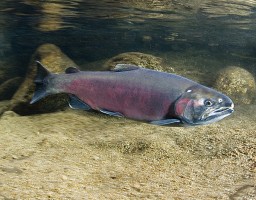
Oregon Coast coho salmon continue to face a myriad of threats, including suction dredge mining (photo by Jeremy Moore).
Harmful to aquatic life. Suction dredging harms fish and other wildlife. Suction dredging reduces the ability of fish to see, feed, and spawn. Additionally, the turbidity and increased sedimentation caused by suction dredging can clog fish’s gills. These impacts further threaten Oregon’s fish and other aquatic wildlife, including endangered salmon species.
Reduction in water quality. Suction dredging decreases water quality, which harms the environment and decreases recreational use of Oregon’s rivers. Suction dredging causes increased turbidity, which decreases the clarity of the water. Additionally, it can cause riverbed sediment to released toxins, introducing mercury into the food system. Many of the rivers mined by suction dredge operators are popular sites for fishing and whitewater rafting. The harm to fish and increased turbidity caused by suction dredging makes these rivers less ideal spots for recreational activities.
Highbanking. The practice of highbanking, where suction dredge operator mine riverbanks, heightens the environmental risks of suction dredging. Highbanking harms vegetation, increases erosion, sedimentation, and turbidity, and can increase river temperatures. This creates further negative consequences for fish and other aquatic species.
Encampment impacts. Suction dredging operators often camp at the riverside for weeks at a time. This encampment can also have serious consequences for wildlife and for the environment. Noise and lights associated with these encampments can disturb aquatic wildlife, land animals, and birds. Human waste may make its way into the river. Operators often do not leave clean campsites when they leave. Additionally, their encampments may conflict with other recreational uses of Oregon’s rivers.
No positive benefits. Suction dredging provides no measurable benefit to the state of Oregon. In addition to these harms to wildlife and the environment, the state of Oregon must pay significantly more to cover the costs of suction dredging than it brings in from permit fees. Suction dredge operators pay only $25/year for their permit to mine recreationally. Many operators have set their sights on Oregon’s rivers after the state of California banned suction dredging because of the environmental consequences. The environmental and economic costs don’t add up. Suction dredging in Oregon must be banned.
Read more: Cascadia Wildlands’ White Paper “Regulation Considerations for Suction-Dredge Placer Mining”
